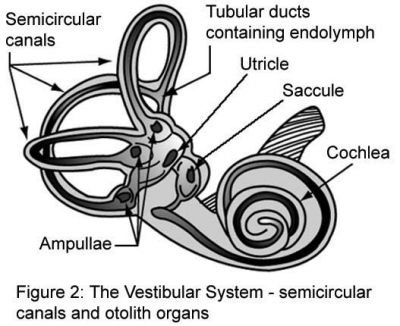Vestibular effects on other body systems

Vestibular organs
By NASA [Public domain], via Wikimedia Commons
The vestibular system helps vertebrates ascertain body position in space and maintain postural equilibrium. Its function is also linked to regulation of the cardiovascular system, the circadian rhythm and bone mineralisation, and EU-funded scientists are unravelling the connections.
For humans and many other animals, sense of gravity and linear acceleration are two ways to get a handle on body position and equilibrium. The otolith organs of the vestibular system are responsible. Scientists are just beginning to unravel the interrelationships of the otolith system with other body systems and functions.
No single scientific team combines all the necessary cross-disciplinary expertise in gravitational physiology. The EU-funded project 'Vestibular system, cognition and vegetative regulations' (SVETA) has brought together important research groups in Europe, Russia and the United States to open new frontiers in this area.
The vestibular system has direct and indirect effects on the cardiovascular system. Project researchers applied a short-term ambiguous otolith stimulation (unclear tilt or translation) in conjunction with visual stimulation to corroborate tilt or translation. Visual stimulation alone had no effect. When it led to a perception of tilt in conjunction with vestibular stimulation, researchers observed a large cardiovascular response in subjects. This supports an interaction between the two systems, results that have been disseminated in two published papers.
Two ground-based paradigms for studying the effects of microgravity are bed rest (extended exposure to a head-down tilt position) and dry immersion (immersing a person in water while covered with an elastic waterproof fabric). Russian scientists have completed the experiments investigating the physiological and cognitive effects of dry immersion. In the next phase, these experiments will be reproduced in other partner labs and the bed rest ones will be done as well.
Experiments exploring the effects of long-term vestibular stimulation or vestibular loss on cognitive and physiological measures are underway. Numerous experiments have targeted connections to the hippocampus, a brain structure known for its well-established role in learning and memory. Scientists have also evaluated effects on bone density. Results have led to three publications.
The fruitful SVETA collaboration is shedding light on the effects of short- and long-term vestibular stimulation on the cardiovascular, skeletal and nervous systems. Outcomes will form critical input to planning of future space exploration missions and will also aid in better diagnosis and treatment of vestibular system-related disorders in other systems.
published: 2015-04-22